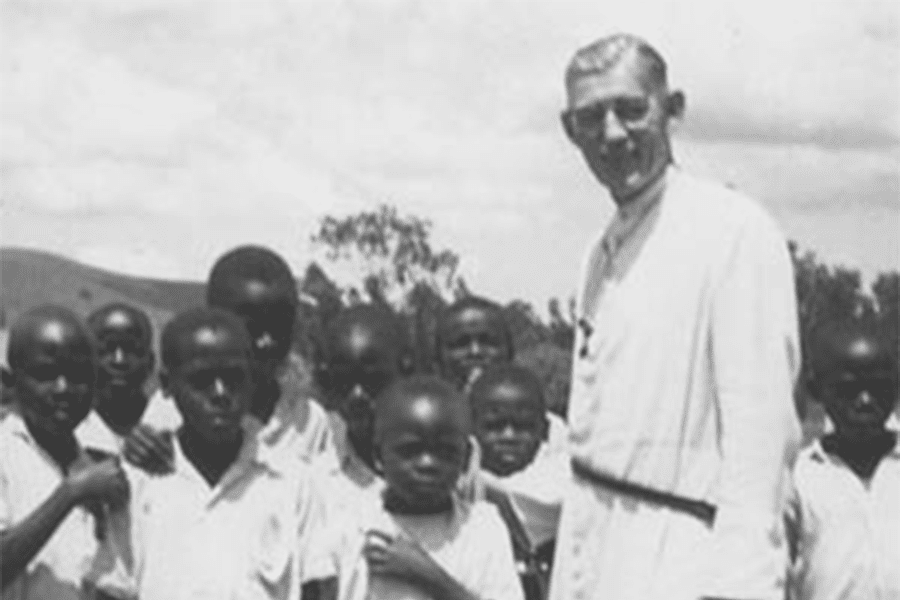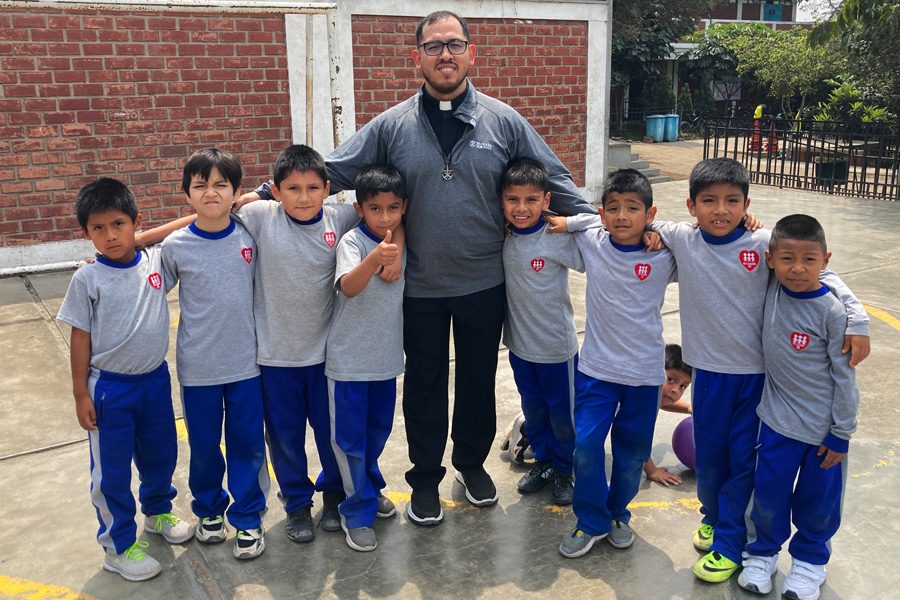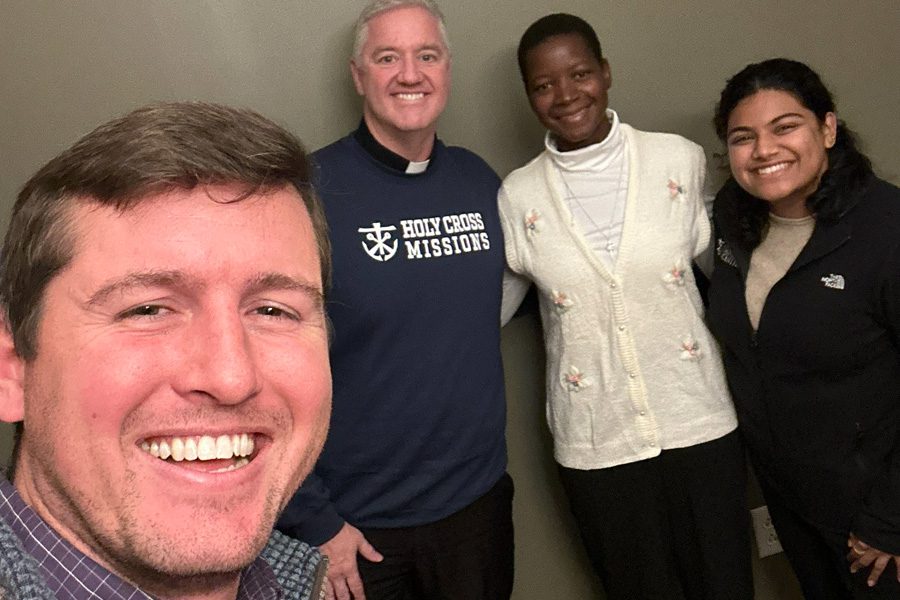
On this anniversary of the death of Servant of God Vincent McCauley, C.S.C., we are pleased to share this article written by Fr. Tom Smith, C.S.C., a longtime Holy Cross missionary to East Africa.
Fr. Richard Gribble, C.S.C., begins his fine biography of Bishop Vincent J. McCauley, C.S.C. with these words from Bishop Vince’s long-time companion in ministry, Fr. John Croston, C.S.C.: On All Saints Day, November 1, 1982, “a valiant man of God died, but a saint was born.” There is much to support this gracious praise celebrating the way God was clearly at work in this holy man of vision, boundless energy, and courage in service of the Gospel. A prayer said in Holy Cross communities each evening captures well, I believe, the central virtues in the life and spirit of Servant of God Bishop McCauley: Devotion to the Blessed Virgin Mary, Missionary Zeal, and Service of Others.
Devotion to the Blessed Virgin Mary
“You cannot understand him at all apart from his devotion to Our Blessed Mother Mary. It is a great love story. She was his heroine, his inseparable companion. He spoke and wrote of her as if she was right by his side.”
Bishop Vince’s love for Mary, so beautifully affirmed here by Fr. Arnold Fell (HCMC Director from 1959-86), one of his closest friends, grew naturally out of the faith and devotion fostered in his Irish Catholic family. His parents, devout members of St. Francis Xavier Parish in Council Bluffs, Iowa, gathered their family daily to pray the rosary. Throughout his missionary life, Bishop Vince turned again and again to Mary to strengthen and guide him. In 1936 on his way to his first mission assignment in what is today Bangladesh, he made a side trip to Lourdes to ask Mary’s help. It was the first of many trips to this shrine of Our Lady. Years later, in 1958, while tirelessly raising funds in the States for Holy Cross mission work, he learned that he had cancer and was told he likely had just 1-2 years to live. Excited about the possibility of helping begin the Holy Cross mission in Uganda, he again turned to Mary, insisting on another stop in Lourdes where he promised to give his life to the church and people of Africa if his health would allow. Fr. Croston, who accompanied him to Lourdes many times, relates that “[h]e seemed transfixed, as if she was speaking to him personally. I saw a statue, but he saw a woman with whom he spoke person to person.” When ordained the first Bishop of Fort Portal Diocese in Uganda in 1961, Bishop McCauley chose as his Episcopal motto: Mariam sequens non devias – If you follow Mary you will not stray, and he named the cathedral, in sight of the snow-capped Rwenzori Mountains, Our Lady of the Snows. His was an unassuming, never showy, but deep prayer and spirituality, and it was abundantly clear that devotion to Mary was at its core.
Missionary Zeal
Vincent Joseph McCauley entered formation to be a Holy Cross priest at Notre Dame and soon after discovered his call to serve God and the Church in the foreign missions. He was ordained in 1934 and assigned to the Holy Cross mission in Bengal, which includes present-day Bangladesh and Northeast India. These were the days of the depression, and insufficient funds delayed his journey, but he finally arrived there in late 1936 and fell in love with the people of Bengal from the moment he stepped off the boat. For the next eight years he taught seminarians and catechists, and then did primary evangelization among the mountain Kuki people, living for a time in a bamboo one-room residence where, he wrote to friends, “the mosquitoes have been getting after me.” During this time contemporaries report that he was invariably enthusiastic, kind, and cheerful in spite of suffering many bouts of malaria, chronic varicose veins and serious phlebitis. It was in these years that the missionary vision to which he dedicated his life was formed – the missionary’s task, he repeated over and over again in word and deed, is to build the local church, to plant the seeds of the Faith and to nourish the tender plants in foreign gardens, then to move on to other gardens. Continuous serious and painful attacks on his health finally forced a return to the States in wartime 1944. Thanks to the life-saving and providential intervention of a childhood friend stationed with the army in India, he was transported on a military plane as a wounded soldier in a chaplain’s uniform!
After the almost two years needed for recovery, Fr. McCauley’s missionary zeal and expertise led to his appointment as superior of the Holy Cross Foreign Mission Seminary in D.C., where his pastoral style and administrative skills earned praise. His genius for fund-raising led to several years as mission procurator during which he made friends and contacts so important to his future work in East Africa. And throughout all this time he kept asking to be allowed to return to the mission field in Bangladesh.
It was not to be. In 1958 an exploratory trip with Fr. Fell to investigate the possibility of opening a new Holy Cross mission in Uganda gave his missionary zeal a new direction, and from then on until his death he gave his heart and his life to the people and church of East Africa. “This is where I should be,” he told Fr. Fell, and within months his remarkable African ministry was underway. Holy Cross joined with the Missionaries of Africa to evangelize in the huge western Uganda diocese of Mbarara. By 1961 a plan to split the diocese with Holy Cross taking responsibility for the northern half was approved in Rome and Fr. McCauley was named the first Bishop of the new Diocese of Fort Portal. He understood that his mission was to build up a local church that could be strong in faith, with its own well-trained ministers. He placed priority on the training of catechists, clergy, and religious, and on promoting education; he brought the Church and Sacraments closer to the people by founding new parishes; he organized the diocesan ecclesial and financial structures and employed his “midas touch” to solicit needed funds; and, as he promoted the advancement of indigenous clergy and religious, he lobbied constantly to receive more Holy Cross priests, brothers, and sisters to serve the multiple pastoral and educational needs of the people. He understood the African political climate of the time and he had the conviction that, in line with it, the Church in Africa must be led by Africans. In 1967 he asked Rome to appoint an auxiliary bishop who could take over the diocese, a request granted in 1969 with the episcopal ordination of Serapio Magambo who would eventually succeed him.
But his pastoral vision and collaborative leadership stretched beyond Fort Portal. As chairman of the Uganda Joint Christian Council he assisted greatly the growth of an ecumenical spirit in a country where religious division had deep roots. He led the planning and fund-raising for a new National Seminary, and he worked to promote the teachings of Vatican II, especially among bishops, clergy, and religious. He was the prime mover in organizing gatherings of the African bishops at that council, and at one of the sessions he was elected chairman of AMECEA (Association of Member Episcopal Conferences Eastern Africa), anticipating his years of effective AMECEA leadership after he resigned as Bishop of Fort Portal in 1972.
Those who worked with him at the AMECEA headquarters in Nairobi in his years as Secretary General from 1973 until 1979 call him the “Father of AMECEA.” He created a true atmosphere of collegiality and solidarity among the Bishops of Eastern Africa, leading them with both humility and pastoral creativity. The late Cardinal Otunga of Nairobi summed up his contribution in this way: “Whatever unity we bishops in Eastern Africa have, we owe it to Bishop McCauley.”
Service of Others
Bishop McCauley’s pastoral and administrative accomplishments are remarkable by any criteria and an incredible gift to the East African church. But what the people mostly remember is this: He was a shepherd who loved and literally gave his life for his flock. As his successor Bishop Magambo wrote, “Besides his work being invaluable, he was ever gentle and generous, ready to receive with sincere love every rank of people, high and low….” He genuinely loved people, and they loved him. He had a big laugh and a joyful sense of humor. And his generosity knew no limit. He could not see a poor or needy person and remain unmoved. He was always available, his door was open, and his common greeting was “What can I do to help you.” He had a particular heart for refugees, and was instrumental in organizing in Fort Portal for the care of those from Rwanda and the Congo, and in Nairobi for those escaping Idi Amin’s Uganda.
And through all these years of missionary love and service Bishop McCauley suffered with a disfiguring facial skin cancer that required numerous trips to the Mayo Clinic and some fifty surgeries. He was a true suffering servant of God.
Fr. Richard Warner, C.S.C., who presided at Bishop McCauley’s burial service, noted that though the sky was mostly clear on that cold November day, a small cloud appeared as those present placed flowers on the casket and a few snow flurries fell. It seemed an appropriate sign of heaven’s welcome for the one who named his diocese after Our Lady of the Snows.
Learn more about Bishop McCauley, C.S.C.
Published: November 1, 2024

Mary Jane DeLaney Endowment Fund 2025-26 Projects Preview
Every year, the Holy Cross Mission Center (HCMC) facilitates the Mary Jane DeLaney Endowment Fund grant cycle, which supports vulnerable women and...

International Apostolic, Justice & Peace 2025-26 Project Preview
The Holy Cross Mission Center (HCMC) recently invited Holy Cross religious from six different countries to apply for the annual International...

Community Outreach Updates: November 2025
The Holy Cross Mission Center (HCMC) is grateful to take this opportunity to share how we have engaged with the community in the past month. Baraka...
